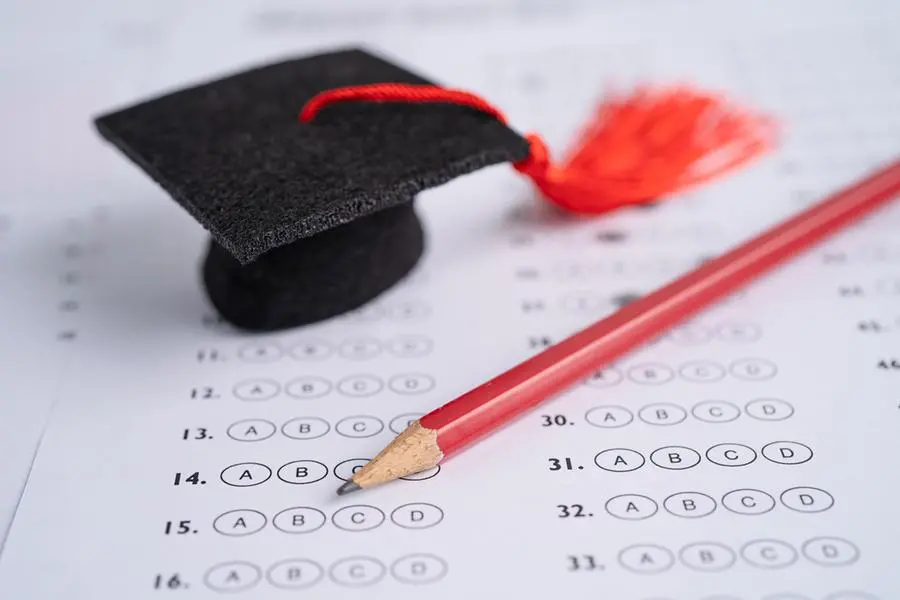PHOTO
The House basic education panel on Monday approved a measure that includes kindergarten and elementary school students in the Department of Education's largest private school scholarship program.
The proposed Expanded Government Assistance to Students and Teachers in Private Education (E-GASTPE) Act aims to extend the scope of the financial support provided by DepEd to private school students. Under this proposed law, private school students in all levels of basic education, not just high school, will be eligible for tuition fee subsidies.
The still-unnumbered substitute House bill was approved 'in principle' pending amendments based on DepEd's planned revision of its criteria for the recognition of private schools.
House basic education committee chair Rep. Roman Romulo (Pasig, Lone District) and principal author of one of the bills consolidated in the measure said that "a new law upgrading the EGASTPE is imperative' given the dip in enrollment in private schools during the pandemic. Based on DepEd records in 2022, at least 425 private schools have shut down since 2020.
'Private educational institutions are currently afflicted with challenges. In 2020 during the first year of the pandemic, their enrollment dropped by 48%. Prior to that, numerous students had already transferred to public schools due to the abrupt migration of teachers,' the explanatory note of House Bill 928 stated.
'This predicament also affects the public schools, which are forced to accommodate the increased enrollment,' it added.
The substitute bill renames the government's voucher program to the 'Basic Education Voucher Program" to cover all private school students from kindergarten to secondary (junior and senior high school) enrolled in DepEd-recognized private schools.
DepEd will determine the amount of tuition fee subsidies to be given to students, and the overall budget for the voucher program will 'be equitably allocated and distributed among all regions … based on official data sources including, but not limited to, congestion data and open seats, giving priority to underprivileged students,' according to the bill.
During the basic education committee's discussions on the measure, Romulo stressed that the criteria for schools joining the voucher program should prioritize those offering quality education more than any other indicator.
Priority to private schools offering quality
Following Romulo's suggestion, lawmakers agreed to tweak the bill's basis for eligible private schools, replacing the criterion on the percentage of priority students in a school with the overall performance of their students in national and international tests.
'I ask the committee to delete this because the only criteria we should look at is the quality of school. Not because DepEd gave them more students in need, that means they should receive more,' Romulo said in a mix of English and Filipino.
'A school will only be given a voucher if they can assure quality education. How will we determine that? It will no longer be based on inputs - such as whether classrooms are complete - but based on output or how well the students performed in local international assessments,' he said.
The House basic education panel chairperson also said that under the proposed E-GASTPE Act, all private school students will be required to take the National Achievement Test to determine the passing rates achieved by each private school.
'If students do not pass these tests, we do not consider it a quality school,' Romulo said, noting that exceptions will be given to geographically isolated and distant schools.
Recognition issues
Romulo noted that the expended voucher program should only include private schools duly recognized by DepEd but acknowledged that the education department must fix its recognition process first to avoid discriminating against private schools that do not own the land where it was built.
'The resource speakers mentioned that the issue in the recognition is not about quality; the real concern is the Department of Education's requirement for schools to own their land,' the lawmaker said.
'So, what we want DepEd to clarify for us is if schools on a long-term lease can be accepted. If that's the only concern, they should clearly advise us, as it would be unfair to schools that meet quality standards but do not own the land exclusively, although they have a long-term lease,' he added.
Rep. France Castro (ACT Teachers) pointed out that APEC schools - which are a chain of private high schools ran by business giant Ayala Corporation - currently operate in various locations that they only lease.
"If I may give an example, APEC schools do not own land but have recognition. They are often situated above a market or on the second floor of a mall. That's also what I want to investigate,' Castro said.
'But small schools without ownership of land, you won't recognize them? There's a double standard,' she added.
Romulo said that DepEd should explain the matter to the committee pending its amendments to the bill.
Lawyer Tara Rama, who works in DepEd's education programs management, said that concerns with its recognition process for private schools will be raised with the department's undersecretary of operations.
Rama added: 'We still submit that only those schools recognized should be part of the voucher because this will also ensure that those fly-by-night schools will not be eligible for the vouchers.'
Copyright © 2022 PhilSTAR Daily, Inc Provided by SyndiGate Media Inc. (Syndigate.info).





















